Abstract
A promoting effect of Na2SiO3 on hair regrowth was investigated using an animal model of C57BL/6 mice. There were four experimental groups including distilled water (DW, a negative control), 5% minoxidil (MXD, a positive control), 50% Na2SiO3, and 100% Na2SiO3 solution. The animals were shaved with an electric clipper and then test solutions applied daily with a volume of 0.2 ml per to the dorsal skin of mice for 3 weeks. Body weight and food and water consumption were measured weekly. Photographs of hair regrowth were taken at experimental day 0, 4, 7, 10, 14, 17, and 21. Activities of alkaline phosphatase and γ-glutamyl transpeptidase as well as expressions of growth factors were also determined in the dorsal skin of mice. The animal body weight were not significantly changed among the experimental groups. The MXD and Na2SiO3 accelerated hair regrowth compared with DW. The elongation of hair follicles were evidently observed in MXD and 50 or 100% Na2SiO3 groups. MXD significantly increased γ-glutamyl transpeptidase at day 14, compared with DW (P<0.05). But the activities of alkaline phosphatase and γ-glutamyl transpeptidase were not significantly increased in Na2SiO3 groups, compared with DW. The expression of epidermal growth factor was significantly increased in MXD and Na2SiO3 groups, compared with DW (P<0.05). The expression of vascular endothelial growth factor was not significantly changed by MXD or Na2SiO3 treatments. The expression of transforming growth factor (TGF)-β1 was clearly decreased in MXD and Na2SiO3 groups, compared with DW. These results indicate that Na2SiO3 may have a hair growth-promoting activity and it can be used for treatment of alopecia or boldness in humans.
Go to : 
REFERENCES
Barel A.., Calomme M.., Timchenko A.., De Paepe K.., Demeester N.., Rogiers V.., Clarys P.., Vanden Berghe D.2005. Effect of oral intake of choline stabilized orthosilicic acid on skin, nails and hair in women with photodamaged skin. Arch. Dermatol. Res. 297:147–153.
Burton J.L.., Marshall A.1979. Hypertrichosis due to minoxidil, Br. J. Dermatol. 101:593–595.
Carlberg I.., Mannervik B.1975. Purification and characterization of the flavoenzyme glutathione reductase from rat liver. Bio. Chem. 250:5475–5480.

Chapman R.E.., Hardy M.H.1988. Effects of intradermally injected and topically applied mouse epidermal growth factor on wool growth, skin and wool follicles of merino sheep. Aust. J. Biol. Sci. 41:261–268.

Chase H.B.., Rauch H.., Smith V.W.1951. Critical stages of hair development and pigmentation in mouse. Phyiol. Zool. 24:1–8.
Deyoung L.M.., Richards W.L.., Bonzelet W.., Tsai L.L.., Boutwell R.K.1978. Localization and significance of γ-glutamyltranspeptidase in normal and neoplastic mouse skin. Cancer. Res. 38:3697–3701.
Elmore A.R.2005. Final report on the safety assessment of potassium silicate, sodium metasilicate, and sodium silicate. Int. J. Toxicol. 24:103–117.
Hamada K.., Suzuki K.1996. Evaluation of biochemical indices as a hair cycle marker in C3H mice. Exp. Anim. 45:251–256.

Handjisiki B.K.., Eichmuller S.., Hofmann U.., Czrnetzki B.M.., Paus R.1994. Alkaline phosphatase activity and localization during the murine hair cycle. Br. J. Dermatol. 131:303–310.
Hattori M.., Ogawa H.1983. Biochemical analysis of hair growth from the aspects of aging and enzyme activities. J. Invest. Dermatol. 10:45–54.

Kaufman K.D.1996. Clinical studies on the effects of oral finasteride, a type II 5α-reductase inhibitor on scalp hair in men with male pattern baldness. In Hair Research for the Next Millenium (Neste, D and Randall, V.A. ed.), pp. 363-364, Elsevier Science, Amsterdam.
Lassus A.1993. Colloidal silicic acid for oral and topical treatment of aged skin, fragile hair and brittle nails in females. J. Int. Med. Res. 21:209–215.

Meister A.., Anderson M.E.1983. Glutatione. Annu. Rev. Biochem. 52:711–760.
Muller-Rover S.., Handjiski B.., van der Veen C.., Eichmuller S.., Foitzik K.., McKay I.A.., Stenn K.S.., Paus R.2001. Comprehensive guide for the accurate classification of murine hair follicles in distinct hair cycle stages. J. Invest.
Nielsen F.H.1991. Nutritional requirements for boron, silicon, vanadium, nickel and arsenic: current knowledge and speculation. Faseb. J. 5:2661–2667.

Schwarz K.1978. Significance and functions of silicon in warm-blooded animals. Review and outlook. Biochemistry of silicon and related problems. (Bendz, G. and Lindquist. I. ed.), pp. 270-330, Plenum Press, NewYork.
Seaborn C.D.., Nielsen F.H.2002. Silicon deprivation decreases collagen formation in wounds and bone, and ornithine transaminase enzyme activity in liver. Biol. Trace. Elem. Res. 89:251–261.

Smith BL.1993. Analysis of hair element levels by age, sex, race, and hair color. In Trace elements in man and animals-TEMA8 (Anke, M., Meissner, D. and Mills, C.F. ed.), pp. 1091–1093. Kluwer, NewYork.
Stenn K.S.1991. The molecular and structural biology of hair: introduction. Ann. NY. Acad. Sci. 642:11–13.

Go to : 
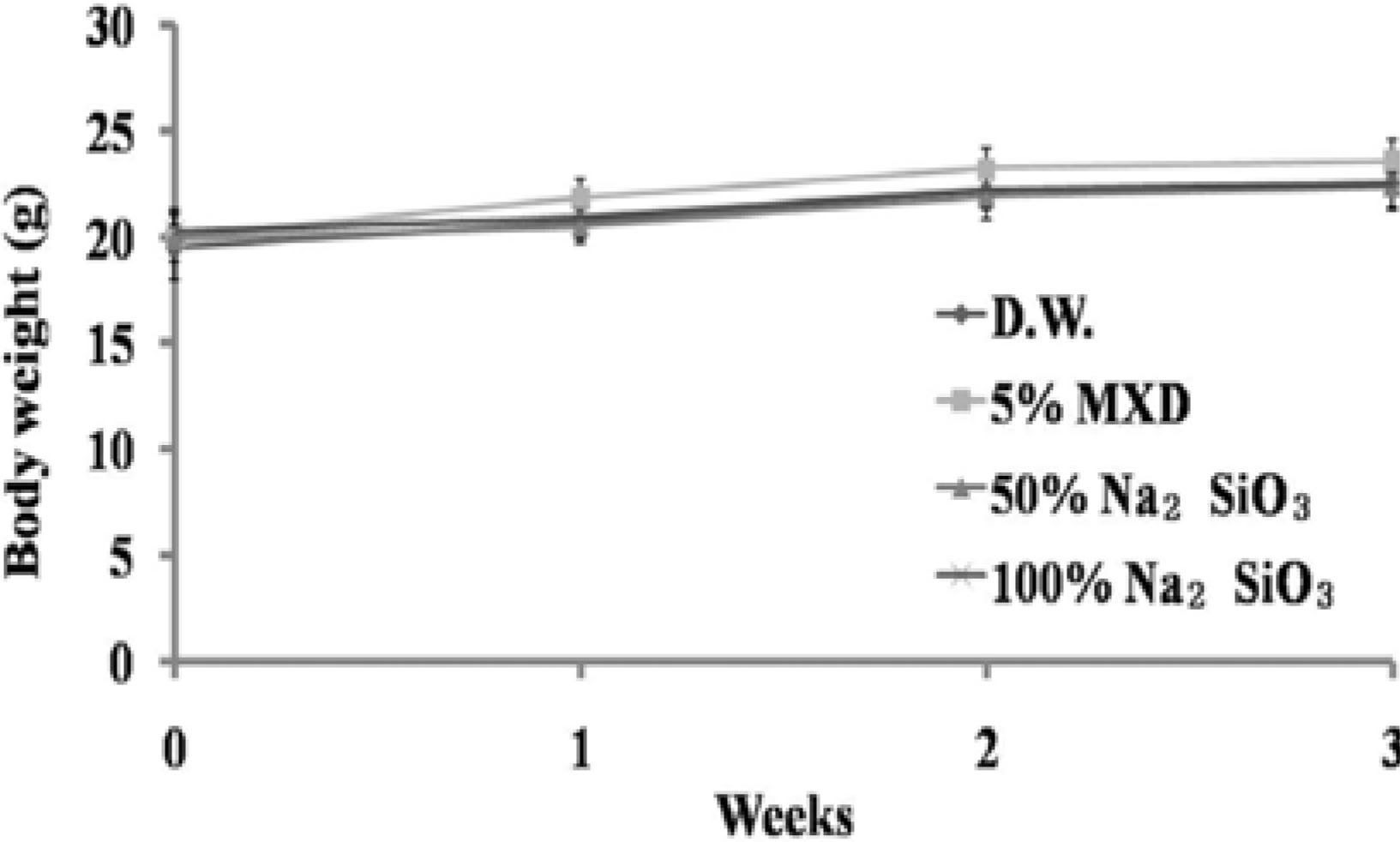 | Figure 1.Change in body weight of C57BL/6 mice for 3 weeks. The animals were shaved with electric clipper and the test compounds applied with 0.2 mL per to the dorsal skin of mice for 3 weeks. D.W: distilled water, MXD: 5% minoxidil. Date represent mean±SD (n=5). |
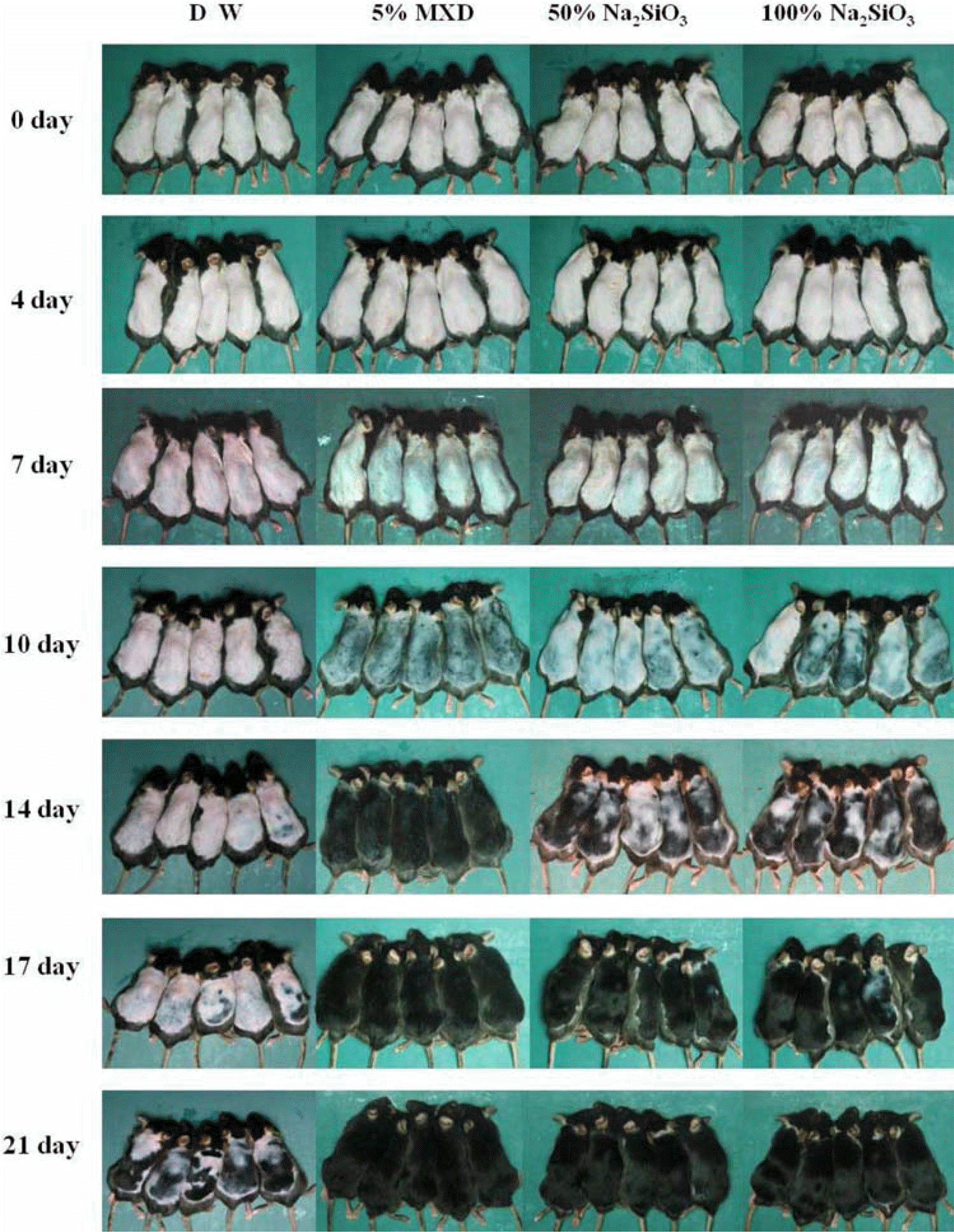 | Figure 2.Photograph of hair regrowth in C57BL/6 mice. The animals were shaved with electric clipper and the test compounds applied with 0.2 mL per to the dorsal skin of mice for 3 weeks. The photographs were taken day 0, 4, 7, 10, 14, 17, and 21. DW: distilled water, MXD: 5% minoxidil. |
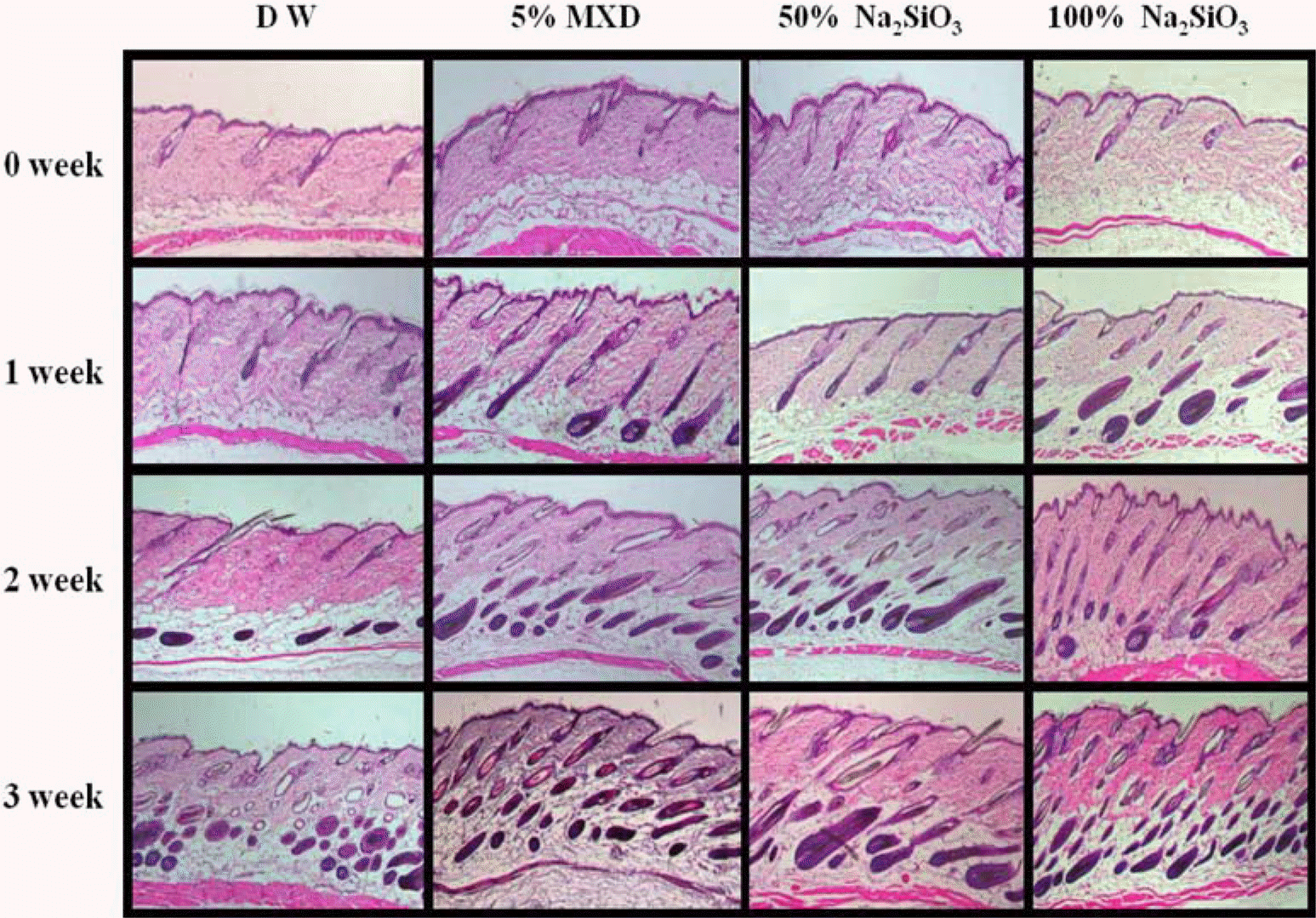 | Figure 3.Histological change of hair follicles in the dorsal skin of C57BL/6 mice (H&E, ×40). The animals were shaved with electric clipper and the test compounds applied with 0.2 mL per to the dorsal skin of mice for 3 weeks. D.W: distilled water, MXD: 5% minoxidil. |
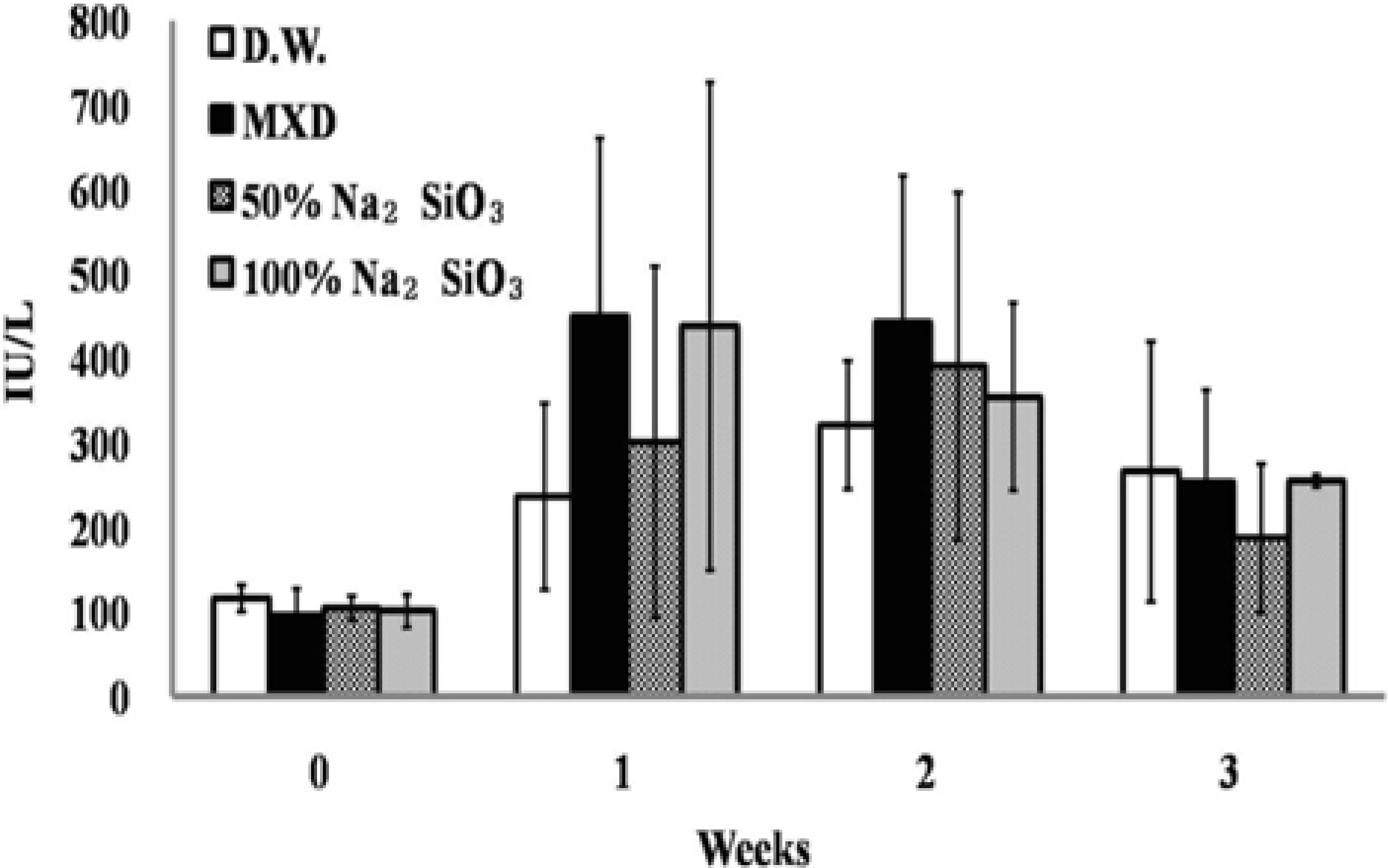 | Figure 4.Alkaline phosphatase (ALP) changes in the dorsal tissue of C57BL/6mice. The animals were shaved with electric clipper and the test compounds applied with 0.2 mL per to the dorsal skin of mice for 3 weeks. D.W.: Distilled water, MXD: Minoxidil. Data represent mean±SD (n=5). |
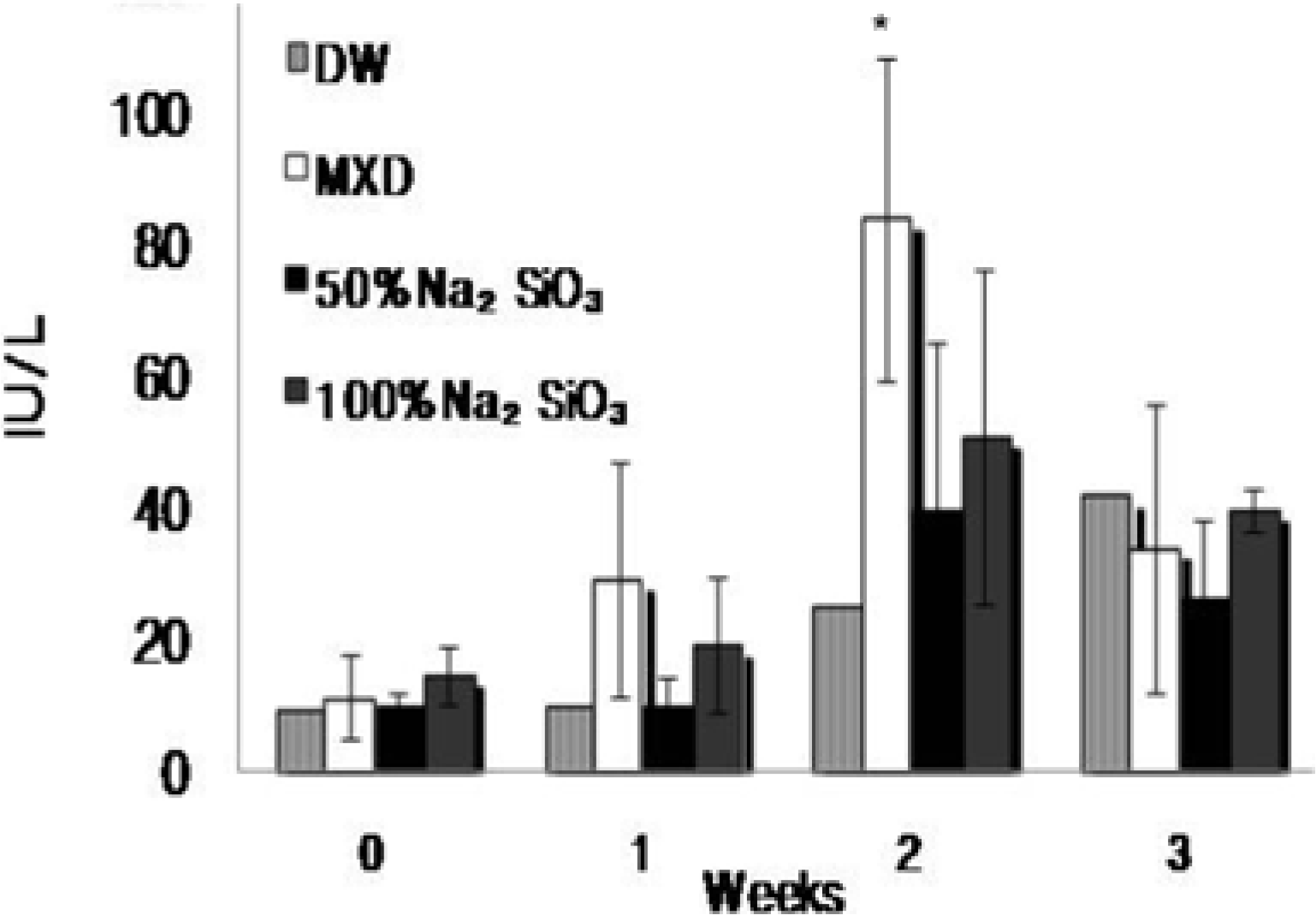 | Figure 5.γ-glutamyl transpeptidase (γ-GT) changes in the dorsal tissue of C57BL/6 mice. The animals were shaved with electric clipper and the test compounds applied with 0.2 mL per to the dorsal skin of mice for 3 weeks. DW: Distilled water, MXD: Minoxidil. Data represent mean±SD (n=5). ∗Significantly different from the D.W. group (P<0.05). |
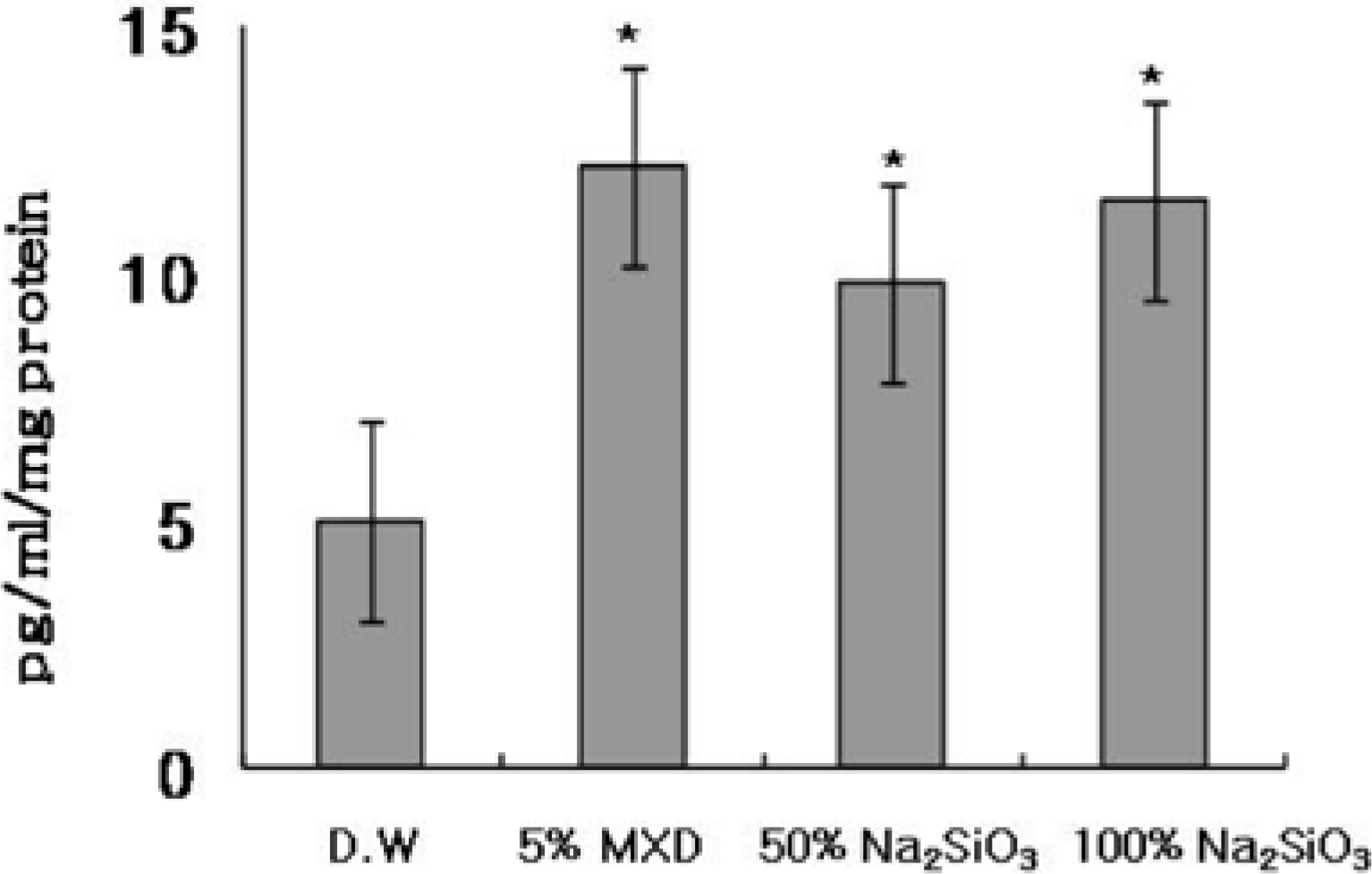 | Figure 6.Activities of Endothelial growth factor (EGF) in the dorsal tissue of C57BL/6 mice. The animals were shaved with electric clipper and the test compounds applied with 0.2 mL per to the dorsal skin of mice for 3 weeks. D.W.: Distilled water, MXD: 5% Minoxidil. Data represent mean±SD (n=5). ∗Significantly different from the D.W. group (P<0.05). |
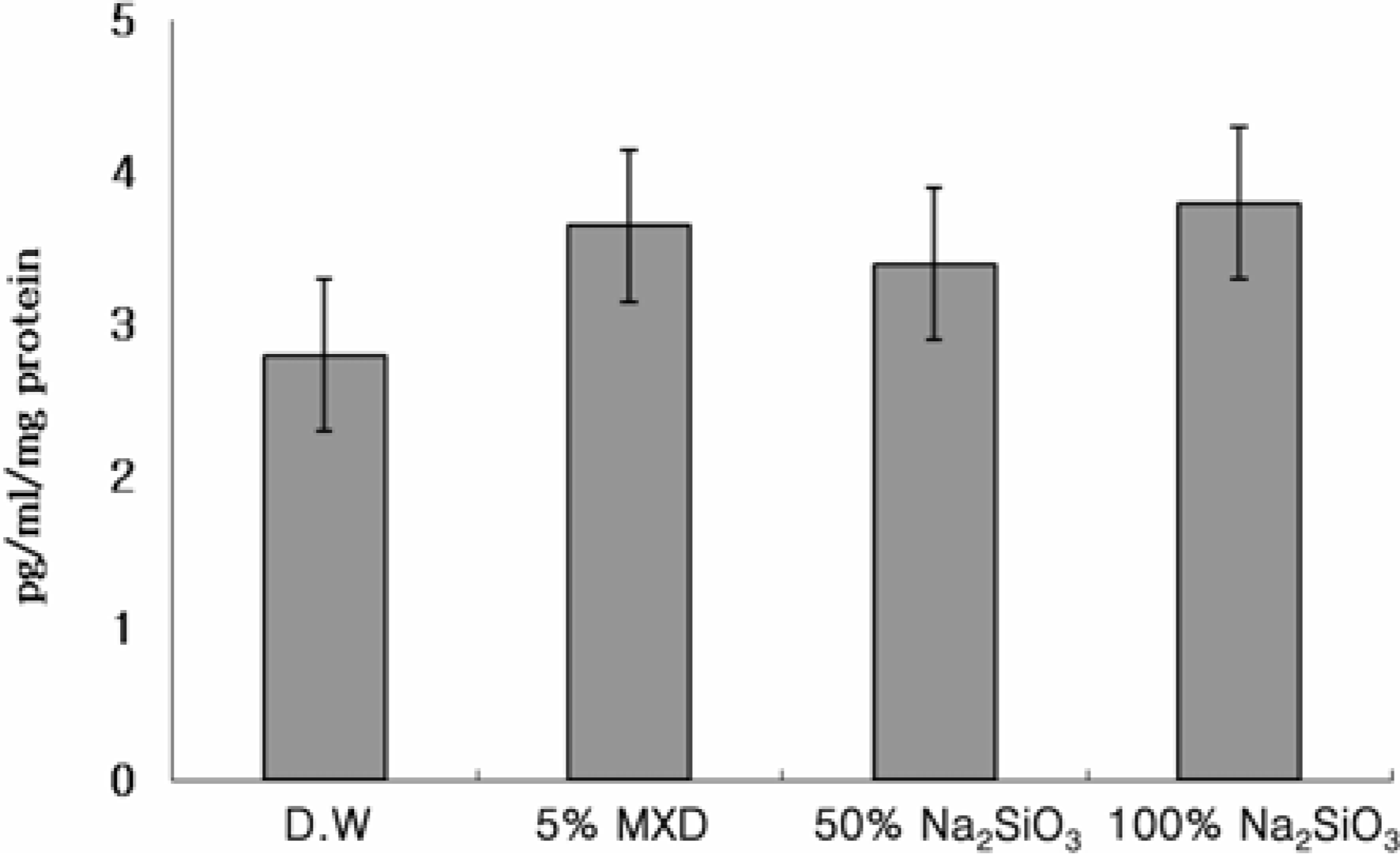 | Figure 7.Activities of vascular endothelial growth factor (VEGF) in the dorsal tissue of C57BL/6 mice. The animals were shaved with electric clipper and the test compounds applied with 0.2 mL per to the dorsal skin of mice for 3 weeks. D.W.: Distilled water, MXD: 5% Minoxidil. Data represent mean±SD (n=5). |
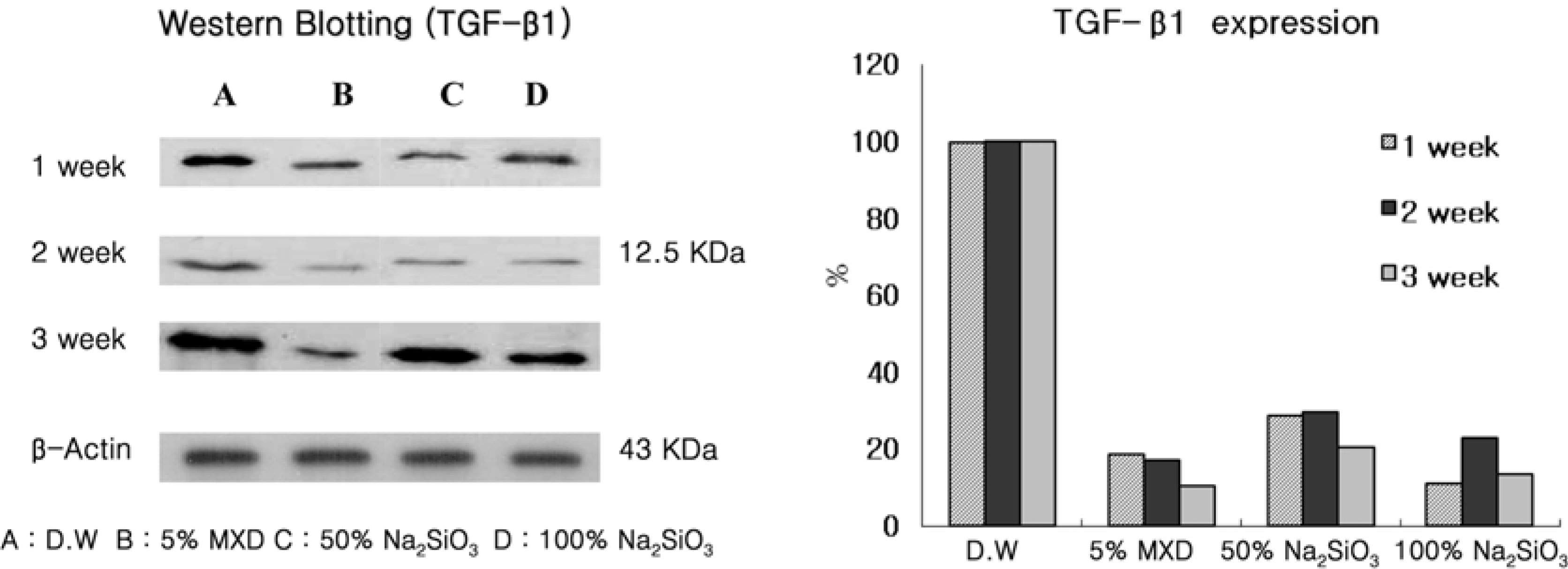 | Figure 8.Expression of TGF-β in the dorsal skin of C57BL/6 mice. The animals were shaved with electric clipper and the test compounds applied with 0.2 mL per to the dorsal skin of mice for 3 weeks. D.W.: Distilled water, MXD: 5% Minoxidil. |




 PDF
PDF ePub
ePub Citation
Citation Print
Print


 XML Download
XML Download